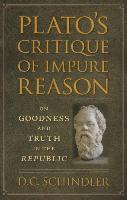Plato's Critique of Impure Reason: On Goodness and Truth in the Republic
BücherAngebote / Angebote:
Plato's Critique of Impure Reason offers a dramatic interpretation of the Republic, at the center of which lies a novel reading of the historical person of Socrates as the "real image" of the good. Schindler argues that a full response to the attack on reason introduced by Thrasymachus at the dialogue's outset awaits the revelation of goodness as the cause of truth. This revelation is needed because the good is what enables the mind to know and makes things knowable. When we read Socrates' display of the good against the horizon of the challenges posed by sophistry, otherwise disparate aspects of Plato's masterpiece turn out to play essential roles in the production of an integrated whole. In this book, D. C. Schindler begins with a diagnosis of the crisis of reason in contemporary culture as a background to the study of the Republic. He then sets out a philosophical interpretation of the dialogue in five chapters: an analysis of Book 1 that shows the inherent violence and dogmatism of skepticism, a reading of goodness as cause of both being and appearance, a discussion of the dramatic reversals in the images Socrates uses for the idea of the good, an exploration of the role of the person of Socrates in the Republic, and a confrontation between the "defenselessness" of philosophy and the violence of sophistry. Finally, in a substantial coda, the book presents a new interpretation of the old quarrel between philosophy and art through an analysis of Book 10. Though based on a close reading of the text, Plato's Critique of Impure Reason always interprets the arguments with a view to fundamental human problems, and so will be valuable not only to Plato scholars but to any reader with general philosophical interests.
Folgt in ca. 15 Arbeitstagen
